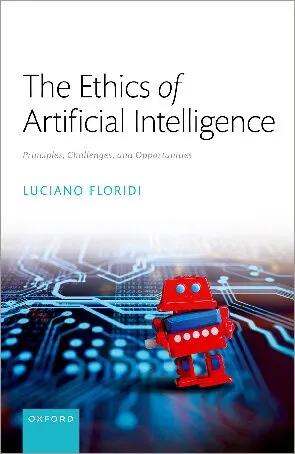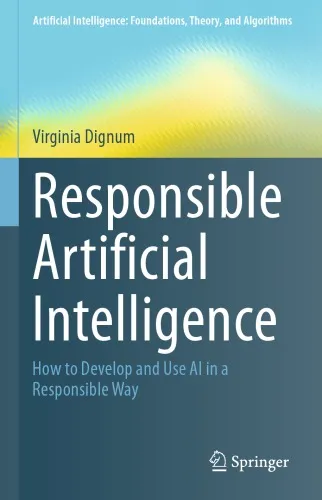The Ethics of Artificial Intelligence: Principles, Challenges, and Opportunities
4.5
بر اساس نظر کاربران

شما میتونید سوالاتتون در باره کتاب رو از هوش مصنوعیش بعد از ورود بپرسید
هر دانلود یا پرسش از هوش مصنوعی 2 امتیاز لازم دارد، برای بدست آوردن امتیاز رایگان، به صفحه ی راهنمای امتیازات سر بزنید و یک سری کار ارزشمند انجام بدینکتاب های مرتبط:
معرفی کامل کتاب «اخلاق هوش مصنوعی: اصول، چالشها و فرصتها»
کتاب «اخلاق هوش مصنوعی: اصول، چالشها و فرصتها» نوشته پروفسور لوچیانو فلوریدی یکی از مهمترین کتابهای معاصر است که به بررسی بنیادین مسائل اخلاقی مرتبط با هوش مصنوعی (AI) میپردازد. این کتاب به طور جامع اصول اخلاقی، معضلات پیچیده و فرصتهای بالقوه فناوری هوش مصنوعی را بررسی میکند و برای مخاطبانی که به دنبال درکی عمیق از تأثیرات اجتماعی، اخلاقی و فلسفی AI هستند، منبعی ارزشمند است.
خلاصهای جامع از کتاب
در این کتاب، فلوریدی تلاش میکند تا مفهومی عمیق از اخلاق AI ارائه دهد. او نشان میدهد که چگونه پیشرفتهای فناوری، نیازمند بررسی دقیق اصول اخلاقی هستند تا از تأثیرات ناخواسته این فناوری جلوگیری شود. کتاب به ترتیب مباحث اصولی مانند احترام به شأن انسانی، حفاظت از حریم خصوصی، توزیع عادلانه منابع و شفافیت در تصمیمگیریهای الگوریتمی را پوشش میدهد.
علاوه بر این، یکی از نکات برجسته این کتاب پرداختن به چالشهای اخلاقی پیرامون AI در زمینههایی نظیر پزشکی، آموزش، و نظامهای قضایی است. از خطاهای اجرایی الگوریتمها تا مسائل مربوط به AI bias و ضررهای اجتماعی، هر موضوع بهطور دقیق تحلیل شده و پیشنهاداتی اخلاقی برای حل آنها ارائه میشود.
فلوریدی همچنین درباره تغییر نقش انسان در عصری صحبت میکند که هوش مصنوعی در بسیاری از تصمیمگیریها دخالت دارد. این کتاب همچنین فرصتهای منحصربهفردی که هوش مصنوعی ارائه میدهد، از بهینهسازی فرآیندهای کاری تا افزایش دسترسی به اطلاعات و توانمندسازی افراد برای حل مسائل پیچیده، را بررسی میکند.
نکات کلیدی کتاب
- 1. اهمیت ایجاد چارچوبهای اخلاقی استوار برای توسعه و استفاده از هوش مصنوعی
- 2. لزوم توجه به شفافیت در الگوریتمها به منظور ارتقای اعتماد عمومی
- 3. شناسایی و مقابله با AI bias در تصمیمگیریها
- 4. بررسی نقش و مرزهای مسئولیت انسانی در تعامل با سیستمهای هوش مصنوعی
- 5. فرصتهای بیبدیل AI در حوزههای پزشکی، آموزش و پژوهش علمی
جملات معروف از کتاب
"ما در دوران اطلاعات نه تنها با چالشهای تکنولوژیک بلکه با چالشهای اخلاقی بیسابقهای روبرو هستیم. هوش مصنوعی، آینده ما را نه فقط از نگاه کاربردی، بلکه از نگاه کیفی بازتعریف خواهد کرد."
"آینده هوش مصنوعی نیازمند مسئولیتی دوگانه است: هم در قبال پیشرفت فناوری و هم در قبال بشریت."
چرا این کتاب اهمیت دارد؟
این کتاب راهنمایی کمنظیر برای علاقهمندان به Ethics of AI، سیاستگذاران، محققان و توسعهدهندگان فناوری است. اهمیت این کتاب در آن است که به جای نگاه صرفاً فنی، رویکردی جامع به مسائل اخلاقی هوش مصنوعی دارد. در دنیایی که هوش مصنوعی بهسرعت در حال تحول است، دستورالعملها و بینشهای ارائه شده در این کتاب به ما کمک میکند تا ضمن بهرهبرداری از قابلیتهای بینظیر این فناوری، اثرات منفی اجتماعی را به حداقل برسانیم.
در نهایت، «اخلاق هوش مصنوعی: اصول، چالشها و فرصتها» به ما یادآوری میکند که فناوری نه دشمن ماست و نه ناجی ما. آنچه اهمیت دارد تصمیمات اخلاقی انسانها در استفادۀ درست از این ابزارهای قدرتمند است.
Introduction to "The Ethics of Artificial Intelligence: Principles, Challenges, and Opportunities"
Artificial Intelligence (AI) is undeniably one of the most transformative forces of our era, reshaping industries and influencing every aspect of modern life. However, this profound technological advancement comes with equally significant ethical questions and dilemmas. In "The Ethics of Artificial Intelligence: Principles, Challenges, and Opportunities," I delve into the philosophical, ethical, and societal dimensions of AI, providing a comprehensive framework for understanding its impact. This book serves as a critical guide for policymakers, technologists, academics, and anyone interested in navigating AI’s ethical terrain responsibly and thoughtfully.
The core purpose of this book is to examine the ethical principles that can guide the development and use of AI, highlight the challenges posed by its rapid growth, and explore how humanity can responsibly harness its opportunities while minimizing harm. By integrating philosophical theories with practical case studies, I aim to strike a balance between abstract ethical reasoning and real-world considerations. This introduction provides an overview of the book’s structure, key takeaways, and contributions to one of the most pressing conversations of the 21st century.
Detailed Summary of the Book
The book is organized into three main sections: Principles, Challenges, and Opportunities. In the Principles section, I establish a philosophical foundation, discussing ethical frameworks such as deontology, utilitarianism, and virtue ethics, and how they apply to AI development and deployment. Concepts like algorithmic transparency, accountability, and fairness are critically examined, laying the groundwork for ethical AI.
The Challenges section tackles the most pressing dilemmas brought about by AI, including bias in machine learning algorithms, data privacy concerns, labor automation, and the potential for misuse in surveillance and decision-making. Here, I scrutinize the ethical tensions surrounding these issues and consider how stakeholders can work collectively to mitigate risks.
The final section, Opportunities, shifts focus to the positive potential of AI. This includes its role in advancing healthcare, education, environmental sustainability, and global problem-solving. Readers are invited to reflect on how AI can be leveraged to uphold our shared humanity and achieve equitable progress, provided that ethical considerations are embedded into its very design.
Key Takeaways
- Ethics must be central, not peripheral, to the design and implementation of AI systems.
- Algorithmic bias is a critical issue that requires practical as well as theoretical interventions.
- Transparency, accountability, and inclusivity are essential principles for AI governance.
- AI’s ethical challenges are global and require collaborative solutions that respect cultural and contextual diversity.
- With the right safeguards, AI holds immense potential to solve long-standing societal problems.
Famous Quotes from the Book
"Humanity must not be subjugated by the power of its own creations; instead, we must coexist with AI under the guidance of ethical principles."
"Ethics is not a roadblock to innovation; it is the compass that points us toward meaningful and sustainable technological progress."
"The future of AI depends not only on engineering it well but also on guiding it wisely."
Why This Book Matters
In a world increasingly shaped by AI, the ethical considerations surrounding its development and application cannot be overstated. "The Ethics of Artificial Intelligence: Principles, Challenges, and Opportunities" is a timely contribution to this critical discourse, offering readers a profound understanding of the moral landscapes of AI. This book equips policymakers, researchers, and technologists with the tools to anticipate risks, identify opportunities, and ensure that AI benefits humanity as a whole.
The book stands out by combining rigorous philosophical inquiry with actionable insights, making it accessible to both lay readers and experts. It advocates for the inclusion of ethics at every stage of AI development, fostering a collaborative and inclusive approach to shaping the future of technology.
At its core, this book emphasizes that the ethical dimension of AI is not a secondary concern but the foundation upon which a responsible and equitable AI-driven world must be built. By engaging thoughtfully with the ideas presented here, readers can join the global conversation on how to guide AI toward a better future for all.
دانلود رایگان مستقیم
شما میتونید سوالاتتون در باره کتاب رو از هوش مصنوعیش بعد از ورود بپرسید
دسترسی به کتابها از طریق پلتفرمهای قانونی و کتابخانههای عمومی نه تنها از حقوق نویسندگان و ناشران حمایت میکند، بلکه به پایداری فرهنگ کتابخوانی نیز کمک میرساند. پیش از دانلود، لحظهای به بررسی این گزینهها فکر کنید.
این کتاب رو در پلتفرم های دیگه ببینید
WorldCat به شما کمک میکنه تا کتاب ها رو در کتابخانه های سراسر دنیا پیدا کنید
امتیازها، نظرات تخصصی و صحبت ها درباره کتاب را در Goodreads ببینید
کتابهای کمیاب یا دست دوم را در AbeBooks پیدا کنید و بخرید
1304
بازدید4.5
امتیاز50
نظر98%
رضایتنظرات:
4.5
بر اساس 0 نظر کاربران
"کیفیت چاپ عالی بود، خیلی راضیام"
Questions & Answers
Ask questions about this book or help others by answering
No questions yet. Be the first to ask!



